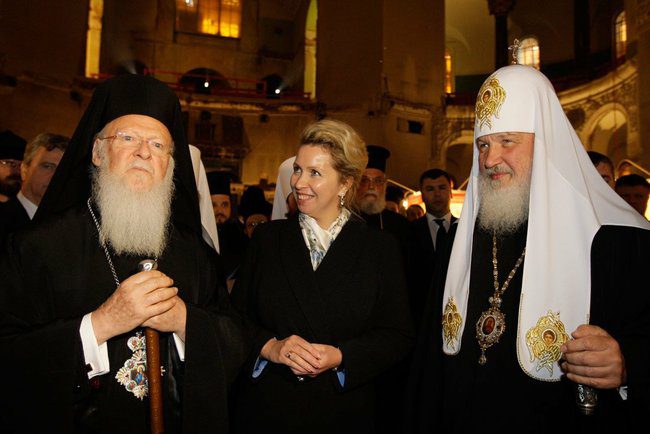There are many facets to the war between Russia and Ukraine. One of them reportedly has to do with the recent schism between Greek Orthodoxy and Russian Orthodoxy.
In the year 988, Vladimir the Great, ruler of the slavic tribe known as the Rus, was baptized, as were all of his people in a mass baptism in the Dnieper river, a condition of his marriage to the sister of the Emperor Basil II of Byzantium. This happened in the city of Kyev in what is now Ukraine. Thus, Christianity came to Russia. This was the beginning too of the Russian Orthodox Church, which sees Ukraine as its ancestral home.
Flash forward through the centuries, including the suppression of Christianity by the Communists in the Soviet Union, to 2018.
The titular head of Eastern Orthodoxy–a sort of pope with much less power–is Bartholomew I, the Patriarch of Constantinople, headquartered in Turkey. The orthodox Christians of Ukraine were under the jurisdiction of the Russian church, headed by Kirill, the Patriarch of Moscow. But, chafing under that domination and the other tensions between the two countries, the Ukrainian churches petitioned Bartholomew I to allow them to separate from the Russian church and to form their own independent church body.
Bartholomew agreed and granted the Ukrainian Orthodox church this “autocephaly,”meaning “self-headed.” The Moscow Patriarch was furious, insisting that Ukraine is part of its “canonical territory.” The controversy escalated to the point that the Russian church repudiated the authority of the Constantinople patriarchate. The result was the 2018 Moscow-Constantinople Schism, in which the Russian church forbade its clergy and laity from receiving the sacraments–including communion, baptism, and marriage–at any church controlled by Constantinople, a ban that soon extended to the other autocephalous church bodies of Orthodoxy. And now the Moscow Patriarchate is starting churches on Constantinople’s turf, especially in Africa.
But don’t the Orthodox all believe the same things? That’s what we hear from American converts to Orthodoxy. Is this just a technical institutional disagreement? Church politics taken way too far? Maybe to an extent. But according to an article on the subject by Katherine Kelaidis, there may be more to it. She writes:
On one side of the conflict is the Ecumenical Patriarch of Constantinople, the culturally and linguistically Greek cleric, who has historically claimed leadership of Orthodoxy. For the better part of a century, the Patriarch of Constantinople has moved toward the West and arguably many of its values. Today’s incumbent on the Apostolic Throne of St. Andrew speaks the language of human rights, religious freedom, and trust in science. This position arises in no small part from the Patriarchate’s own precarious role as a representative of minority religion in Turkey.
At the same time, the Patriarch of Moscow, having reclaimed much of his post’s former political influence in a post-Soviet Russia, has taken to spearheading not only the traditionalist Orthodox cause, but acting as support and symbol to religious conservatives around the world.
For a good, detailed discussion, including the close ties between the Russian church and President Putin, read Putin’s Spiritual Destiny by journalist and cleric Giles Fraser.
I know of quite a few people–evangelicals, Catholics, even Lutherans–who have “swum the Bosphorous” to convert to Orthodoxy. That includes some of you regular readers of this blog. Can you help us out here?
Has this schism had an impact on orthodoxy in America? I am aware of several different orthodox affiliations in this country. I assume the American church isn’t “autocephalous,” or is it? Are there any prospects of that?
Are some American orthodox in fellowship with the Russian church? I assume there are congregations consisting mostly of Russian immigrants and expatriates. If you are under Patriarch Bartholomew, I guess you can’t attend those. Does it go the other way also? Has Bartholomew disfellowshipped the Russians? Can they commune in American orthodox churches?
Is the description quoted above about Constantinople being more open to the West (the implication being “liberal”) and Moscow being more “conservative” accurate? And is the Russian church really “acting as support and symbol to religious conservatives around the world”? If so, where does that show up? I haven’t noticed it here. And how “conservative” can a church be that sells out to the world?
As a Lutheran, this seems to me to exemplify the problems that arise when churches are too invested in their institutional hierarchies, their place in the surrounding culture, and their political entanglements. As opposed to emphasizing faith, Christ, and the Word of God.
Photo: Patriarch Bartholomew I (left) and Patriarch Kirill (right) by Kremlin.ru, CC BY 4.0, https://commons.wikimedia.org/w/index.php?curid=10554276














